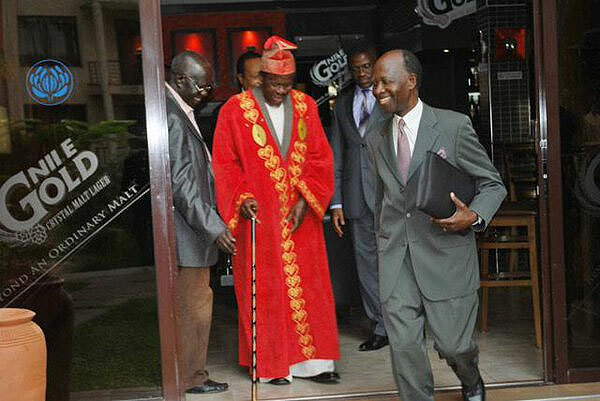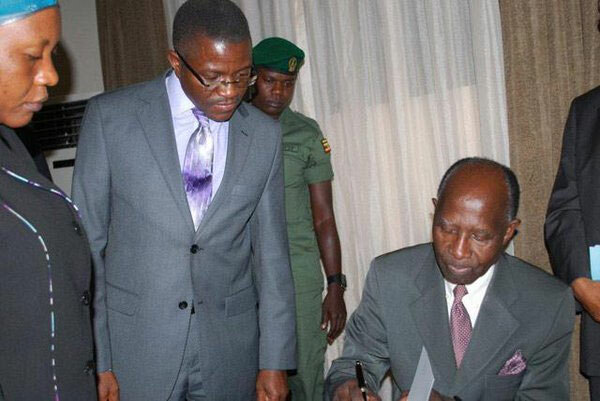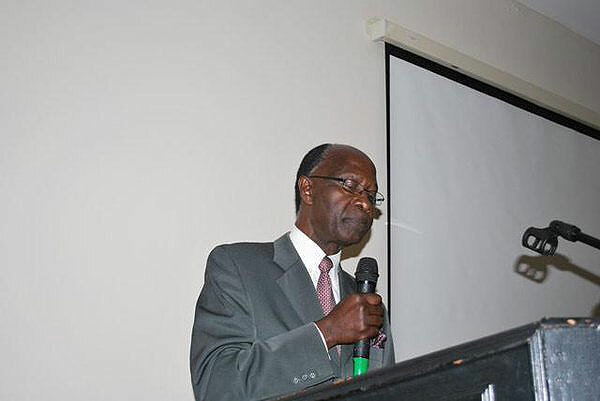A Rolling Stone: An autobiography of Prof Olweny
Prof. Charles Olweny’s autobiography adds to the few books written by Ugandans that give us a glimpse of life in 70s, 60s and earlier.
AUTOBIOGRAPHY | PROF. CHARLES OLWENY
Professor Charles Olweny's autobiography adds to the few books written by Ugandans that give us a glimpse of life in 70s, 60s and earlier. It is in a way a short history of Uganda in Prof. Charles Olweny's eyes.
His autobiography is told in numerous short stories, as he recalls different episodes in his life.
The title is derived from the saying; A rolling stone gathers no moss, which says a lot about Olweny's life journey that sees him literally traversing the world.
During the launch of the book on November 21, there was some debate about the title. Reviewers thought title should have been The Nomadic Medic or The Boomerang referring to that which is thrown away, but comes back home. But perhaps that would have given the book a negative connotation.
Professor Olweny is a rolling stone to the extent that his career takes him from one country to another. But maybe, this rolling stone gathers some moss - given the responsibilities, the accolades, and the wealth of experience Professor Olweny garners along the way.
His is a story of an unending quest for excellence, which starts right from early childhood. One time in primary school, he came last in a class of fifteen. For fear of embarrassment, he tried to change the results on his report card to make it look like he had come first. That came with serious repercussions, which caused him to realize that excellence could not come through doctored documents. One had to work to excel. He has never gone back on this principle.
Throughout secondary school, graduate and post graduate studies, he excels. When he gets into medical practice, he excels! He shows how any determined boy, even far away in Nagongera, Tororo can excel and go on to a world stage.
As a medic, Professor Olweny boasts of many outstanding achievements. His specialisation in oncology takes him to unprecedented levels of success. He reminisces the days when the Uganda Cancer Institute in Mulago was the leading cancer treatment centre and the whole world looked to it for ground breaking solutions in cancer treatment.
He explains the different pioneering work done at the cancer institute. Back in the 70s, cancer sufferers from all over the region sought treatment from Mulago. Today, Ugandan cancer patients have to travel abroad to get treatment.
In the scarcity of the 70s, patients were needlessly dying in Mulago, yet all they needed were basic drugs like aspirin and chloroquin. He was the first doctor to suggest to the World Health Organisation (WHO) to develop Essential Drugs lists. At the initial discussion of that idea, he developed a list of ESSENTIAL DRUGS needed to run a hospital. He then developed a list of essential drugs for cancer treatment. The WHO adopted the essential drugs approach and now its worldwide practice.
He describes Uganda's education system, and praises Makerere University for products that could compete for jobs anywhere in the world - especially on the field of medicine.
He describes the turmoil of the 70s, the contradictions and how a Ugandan could survive in the uncertain era under Idi Amin. Like many other people, a time came when he could no longer survive in Uganda. He describes his miraculous escape and his decision to leave Uganda never to return.
After twenty years of excellent service in Australia, Canada and other countries, he makes a decision to return to Uganda. He finds a different Uganda from the one he knew. He decries especially the vice of corruption.
He describes his tenure as Vice Chancellor of UMU Nkozi, as both challenging and enriching.

Kwar Adhola Moses Owor arrives for the book launch
Launching the book on November 21, King of the Jopadhola, Kwar Adhola Moses Owor observed that all professor Olweny's recollections and accounts are true and vividly relayed, which is characteristic of the author's truthfulness. However, Kwar Adhola said, "being truthful may also make you leave out some information." But Professor Olweny's autobiography does not make you feel like there is any bit of information he left out. It is rich and very well told as it is.
(A Rolling Stone is available in all leading bookshops in Kampala at sh25,000).
______________________________________________________
PEOPLE'S VIEWS ABOUT PROF. OLWENY
Launching the book, the Tieng Adhola, Moses Stephen Owor also known as Kwar Adhola of the Jopadhola chiefdom vouched for the facts contained in the book, given his close association with Olweny, which he said dates back to the time he was born.
Olweny and Owor are maternal cousins, who grew up together, becoming very close friends under the custody of Mark Owor, Olweny's father.
"Olweny is everything for truth and due dignity and there to alleviate people's sufferings, be it in form of ignorance, diseases, injustice and abuse of other people's rights," the Kwar Adhola said.
Commending the autobiography which he recommended members of public to read, Owor urged readers to emulate Olweny's, "thirst for charitable deeds without bounds."
Dr. David Serwadda from the school of public health, at Makerere University, extoled Olweny's work, persistence and dedication that has seen him publish despite the enormous challenges, saying it is rare to come across an autobiography of a teacher.
"He has produced an important piece of work that represents a milestone in Africa. This means it can be shared widely and his relatable stories in this book will help our people know that anyone from any part of the world can pave his way to the top," Serwadda noted.
Makerere University's Vice Chancellor Prof. John Ddumba says, "Prof. Olweny is a hardworking, good and very principled academician. He is also professional; qualities which have helped him transform UMU." He adds that, Prof. Olweny, "deserves the best in life for his contribution to the country and other parts of the world."

Katikkiro of Buganda gets his copy signed
______________________________________________________
PROFILE
Prof. Olweny: A rolling stone that gathered moss
Any nun would cringe at the thought of foolery even when asked to fool herself when no one is watching. But perhaps the nun who duped Idi Amin's soldiers about the whereabouts of Prof. Charles Olweny has never been remorseful about it. In fact, she must have even gone ahead to ask the Almighty God not to blame her.
She was saving a life of Prof. Charles Olweny in 1979 when Amin's soldiers had raided St. Anthony Hospital, Tororo looking for him. This was in 1979 at the time Amin's government was thwarting Liberation fighters from taking control of the country.
Olweny had deserted the war-torn Kampala with his family and relocated to Tororo. He had become a regular at the said hospital helping out with medical practices, when these soldiers found out his whereabouts and sought him. They never found him and the nuns promised to alert the soldiers whenever Olweny showed face. Of course, the nuns did not alert the soldiers and instead, advised Prof. Olweny to hide in the Convent until Tororo was safe. Such is the kind of life Prof. Olweny has lived. A life that has weathered all threats and challenges and soared to dignifying heights.
Born to Mark Raphael Owor (RIP) and Anna Theresa Akumu in 1940 in Ngora district, Olweny decided against his birth name Oketcho and adopted the former; derived from the Luo verb "Lwenyo" which means to fight. Indeed he has been a gallant fighter to attain all what he has in life. His father was a school teacher.
He writes in his autobiography ‘A Rolling Stone' that, "My parents taught me three things to strive for if I hoped to succeed in life, namely, fear God, respect authority, irrespective of where it comes from as all authority comes from God, and to work hard.
He adds that his father told him that, "You will never have authority until, learn to respect authority. He stated to me over and over again that I had to find some authority worthy of my respect.
"He went on to stress that love, mixed with admiration, is the foot for the male soul!" I have added a fourth [virtue] to my children and grandchildren, namely, be disciplined. To me discipline is doing the right thing when no one is watching.
Prof. Olweny is a Ugandan physician and the former Vice Chancellor of Uganda Martyrs University (UMU), whose education background involved changing schools like a rolling stone. He was replaced at UMU in January this year, by Dr. John Chrysostom Maviiri.
Besides Olweny being the only boy in a girls' convent school at two years old at some point of his life, Olweny attended St. Wilbrod Primary School, Nagongera, Tororo College primary school, St. Peter's college, St. Mary's College Kisubi before graduating with a Bachelor of medicine, Bachelor of surgery and Masters in Medicine at Makerere University in 1970. He later obtained a Doctorate of Philosophy from Makerere University.

Olweny gives a speech at launch of his autobiography
In his book, he also recalls not honouring a government scholarship to study dentistry in England because his parents feared he would marry a white woman.
"I initially chose to do dentistry but my parents were not particularly pleased with the decision. They told me Africans did not have dental problems. I suspect though that they felt rather strongly that if I went to England I would end up marrying a white girl."
Married to Phoebe Negessa with five adult children, the family trotted the globe wherever he got posted for work.
In 1971, after completing his masters of medicine at Makerere University, while also serving as lecturer in internal medicine at the university, Olweny started off his globetrots by going to the Karolisnka Institute of Tumour Biology in Stockholm, Sweden to get more training on immunology.
From Stockholm, he went to National Cancer Institute/National Institutes (NCI) of Health in Bethesda, Maryland along with his family for further training in Oncology. But the two-year study plan at NCI was cut short in 1973 after receiving a call from his mentors in Uganda to return rescue the Uganda Cancer Institute (UCI) from destruction.
"Amin expelled all Ugandan Asians holding British passports and many non-Asian expatriates were forced to leave Uganda as well.
"I received a message to the effect that if I did not return to Uganda, I would find nothing to return to. The Uganda Cancer Institute (UCI) that had been established by the National Cancer Institute (NCI) and had several NCI young investigators who had left the country. Two investigators remained. These were Dr. Ian Magrath, a British doctor who had come to gain experience in cancer management in the Third World, and Dr. Charles Vogel who defied all odds and stayed on. Both of them wanted for me to return to Uganda to effect an appropriate handover.
"The Uganda Cancer Institute was one such showpiece. [President Amin] made sure every government guest visiting Uganda was brought to the Uganda Cancer Institute to showcase how Ugandan institutions were running smoothly and efficiently, said Dr. Olweny.
Dr. Olweny would later work as Chairman of Uganda Breweries and Nile Breweries and President of Uganda Medical Association. He also worked with WHO branch in University of Zimbabwe in 1983 and a year later, became Director of medical Oncology at the Royal Adelaide Hospital, Australia.
After five years in Australia, where he was also awarded the degree of Fellow of the Royal Australasian College of Physicians, Olweny and his family relocated to Winnipeg, Canada to become a Professor Of medicine and Co-Director of the WHO Centre for Quality of Life in Cancer Care, University of Manitoba.
One of his medical achievements could be when, while still director of UCI (1972-1982), he led a team of Ugandan medical researchers that turned out to be first group to demonstrate that liver cancer could be successfully treated with chemotherapy using the drug doxorubicin, which is still the mainstay of treatment for liver cancer today. They were also able to confirm that Burkitt lymphoma could be cured with a high dose of chemotherapy and showed that the same was true for childhood Hodgkin disease.
After 16 years in Canada, Prof. Olweny returned to Uganda in 2007 to take up Vice chancellor position at UMU. "I had done enough international service. Having rationalized that way, the decision to leave was easy and the rest is now history."